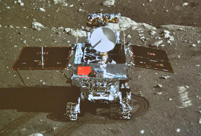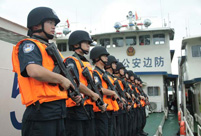 'Jin' named the word of the year by cross-strait netizens
'Jin' named the word of the year by cross-strait netizens Chinese scientific expedition goes to build new Antarctica station
Chinese scientific expedition goes to build new Antarctica station
 Chinese naval escort fleet conducts replenishment in Indian Ocean
Chinese naval escort fleet conducts replenishment in Indian Ocean 17th joint patrol of Mekong River to start
17th joint patrol of Mekong River to start China's moon rover, lander photograph each other
China's moon rover, lander photograph each other Teaming up against polluters
Teaming up against polluters
Chaotic market
Tourist numbers are on the increase in China. Official figures showed that 3 billion tourists took in the sights in the country last year and the industry was worth 2.3 trillion yuan (US$376 billion), a year-on-year increase of 12 percent and 17.6 percent, respectively.
The rising numbers of tourists who swarm scenic spots during China’s Golden Week holidays are putting pressure on cities.
What adds fuel to the flames is that unregulated guides, with no official supervision, are rampant in many cities, leading to complaints from visitors.
Also, vandalism by tourists has generated headlines, making other visitors’ experiences unpleasant.
To upgrade the tourism industry in various locations in China, it is necessary to change the situation in which revenue is mainly generated based on ticket sales, said Fu Shuaixiong, a tourism economy expert from Peking University.
“It is urgent to develop tourism-related industries rather than just depending on tickets, a low-level and old way of generating revenue, which is still being practiced in many scenic spots in China,” Fu said.
He said that accommodations, food service and recreation projects should be strengthened so that even if ticket prices are lowered, the various projects will actually attract more tourists and contribute to higher profits, which will in turn create a sound tourism economy.
Environmental threats
Li said many places suffer from pollution and damage to cultural relics, caused by nature and as well as mismanagement. “And in turn the problems are scaring tourists away,” Li said.
In April, two days of gales pushed almost 60 tons of garbage onshore at Silver Beach, dubbed by some as the country’s No. 1 beach, in southern China’s Beihai city in Guangxi.
Alongside natural waste such as seashells, seaweed and dead crabs, rubbish dotted the site, turning the beach into a dump.
Plastic bags, beer bottles, shattered glass and bamboo sticks used for grilling were piled in the middle and eastern areas of the beach because of the southwestern monsoons. Local tourism managers said they were left helpless.
But rubbish is just part of a broader picture. Last year alone, an estimated 1,800 tons of garbage was found on the beach, according to Yin Fengzhang, environmental management director with the Management Office of Beihai Silver Beach Tourist Area.
The local administration committee had garbage collectors cleaning the beach every day. But the rubbish just kept coming, which tarnished the image of the city.
Beihai, however, is only one of many Chinese coastal cities struggling with similar problems, said Chen Changrong, director of the Policy, Regulation and Planning Section of Beihai’s Oceanic Administration Bureau, who boasts 25 years of experience in maritime issues.
The country’s 2012 report on maritime environmental quality shows that floating chunks of rubbish on supervised waters off coastal cities averaged 17 pieces per kilometer in 2011, and the number more than doubled to 37 in 2012.


 People prepare for upcoming 'Chunyun'
People prepare for upcoming 'Chunyun'  Highlights of Beijing int'l luxury show
Highlights of Beijing int'l luxury show Record of Chinese expressions in 2013
Record of Chinese expressions in 2013 China's moon rover, lander photograph each other
China's moon rover, lander photograph each other 17th joint patrol of Mekong River to start
17th joint patrol of Mekong River to start Spring City Kunming witnesses snowfall
Spring City Kunming witnesses snowfall Heritage of Jinghu, arts of strings
Heritage of Jinghu, arts of strings Weekly Sports Photos
Weekly Sports Photos PLA elite units unveiled
PLA elite units unveiled  China's stealth fighters hold drill over plateau
China's stealth fighters hold drill over plateau Chinese navy hospital ship's mission
Chinese navy hospital ship's mission  "Free lunch" program initiated in NW China
"Free lunch" program initiated in NW China  Rime scenery in Mount Huangshan
Rime scenery in Mount Huangshan DPRK's Kaesong Industrial Complex
DPRK's Kaesong Industrial Complex 'Jin' named the word of the year
'Jin' named the word of the year Day|Week|Month